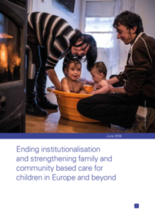About this document
Too many children, persons with disabilities and other vulnerable groups are being deprived of their family and community by being placed in large-scale residential institutions. These institutions are extremely harmful to an individual’s well-being and development, and significantly more expensive than community- or family-based care.
This document was developed by UNICEF with funding support from the Oak Foundation, and in broad consultation and partnership with a range of civil society groups, NGOs and networks which are engaged in advocacy, monitoring, and programme guidance around transitioning from institutional care to community- and family-based care. The effort’s aim is ambitious, but simple: Influence policymakers in the European Union to strengthen their commitment to assisting governments’ transition from institutional care to community-based care in the next Multi-Annual Financial Framework (2021-2027).
Over the course of 2017, the European Expert Group (EEG) on Transition from Institutional to Community Based Care was intensively involved in reviewing and refining the messages contained in this document, with periodic reflections on what will help to motivate policymakers in the EU to take bold action. Extensive inputs were received from the UN Office for the High Commissioner on Human Rights, EuroChild, LUMOS Foundation, the European Association of Service Providers for Persons with Disabilities, Inclusion Europe, and Hope and Homes for Children.
UNICEF is urging the EU and other policymakers to reinforce their commitment to finance deinstitutionalisation and social welfare reforms in and outside the EU.

